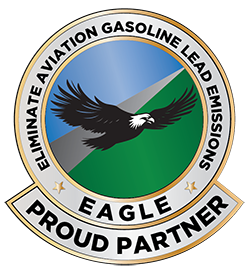|
EAGLE Initiative Making Progress
Robert Olislagers Announced as Senior Coordinator, ICAS and NASAO Join Executive Committee and Pillar Leads Introduced
WASHINGTON, D.C. – Today, the Eliminate Aviation Gasoline Lead Emissions (EAGLE) initiative executive committee announced Robert Olislagers as Senior Coordinator of the initiative, announced that the International Council of Air Shows (ICAS) and National Association of State Aviation Officials (NASAO) have joined EAGLE’s executive committee, and formally introduced the leads for the initiative’s key focus pillars.
“After decades of trial and error, we are on the threshold of an unleaded future for general aviation,” said Billy Nolen, Acting Administrator for the Federal Aviation Administration. “As the EAGLE initiative moves forward, strong leadership and an unwavering focus on safety will be crucial.”
Prior to joining EAGLE, Olislagers served in numerous airport leadership positions, focusing on various priorities including economic development, environmental sustainability, aviation security, and workforce development. He participated in several National Academies of Sciences, Airport Cooperative Research Program studies, including “Options for Reducing Lead Emissions from Piston-Engine Aircraft” published in 2021. Under his watch, Centennial Airport became the first general aviation airport in Colorado to adopt a sustainability program, earning the state’s gold standard.
“Robert brings a wealth of subject matter knowledge and expertise to EAGLE, and we look forward to having him lead this important initiative as it continues to gain momentum. He is determined to see EAGLE succeed in its work across its four pillars to ensure a viable and safe transition to an unleaded future state for piston-engine aircraft,” said the EAGLE executive committee.
EAGLE’s executive committee, which oversees the progress and direction of the initiative and consists of leaders from the FAA and aviation and petroleum groups, was pleased to welcome ICAS and NASAO as committed stakeholders. ICAS and NASAO will be joining the Aircraft Owners and Pilots Association (AOPA), American Association of Airport Executives (AAAE), American Petroleum Institute (API), Experimental Aircraft Association (EAA), General Aviation Manufacturers Association (GAMA), Helicopter Association International (HAI), National Air Transportation Association (NATA), and National Business Aviation Association (NBAA) as executive committee members.
“This is a vital initiative for general aviation and the air show community is proud to be a part of it,” said John Cudahy, President of the International Council of Air Shows. “We intend to use our bully pulpit at hundreds of air shows every year to let millions of spectators know about the important work underway to eliminate lead in aviation fuel by 2030.”
“Although NASAO has supported the EAGLE Initiative from its inception, we are pleased to now formally join the stakeholders partnered in this critical effort,” said Greg Pecoraro, President of the National Association of State Aviation Officials. “State aviation agencies have long understood the vital need for an alternative to 100LL and as leaders in planning for state airport systems, they look forward to assisting airports prepare for a lead-free future.”
The executive committee also formally announced the leads of the initiative’s four key pillars – Regulatory and Policy, Unleaded Fuel Testing and Qualification, Research and Development, and Supply Chain Infrastructure and Deployment. The Regulatory and Policy pillar is being led by Ralph Iovinelli, who is Manager of the Emissions Division in the FAA Office of Environment and Energy. The Unleaded Fuel Testing and Qualification pillar is being led by Maria Di Pasquantonio, who is Manager of the Research Coordination/Alternative Fuels Program at the FAA Aircraft Certification Service. The Research and Development pillar is being led by Tim Smyth, who before retirement served as Manager of the FAA’s Chicago Aircraft Certification Office (ACO). The Supply Chain Infrastructure and Deployment pillar is being led by Ryan Manor, who retired from the petroleum industry after 32-years, with a significant portion of that in aviation fuels business.
“The collaborative work being accomplished through EAGLE’s four pillars supports the safe expansion and acceleration of actions and policies necessary for a viable high-octane unleaded replacement for the piston-engine fleet. We are grateful for the work that these leads have already put into the initiative and are confident that their work going forward will provide for a safe transition without compromising the existing transportation infrastructure system, aviation safety, or the economic and broader public benefits of general aviation,” said the EAGLE executive committee.
While EAGLE’s focus is on helping bring unleaded solutions to the nation’s airports, it also encourages airports and airport sponsors to keep this transition safe and secure by providing a supply of 100LL to be available for aircraft that need the higher octane to fly safely. These aircraft include those performing such vital missions as search and rescue, disaster relief, law enforcement, and agricultural support.
Since its formation in February, EAGLE has held two stakeholder meetings and established groups which have been actively working on the initiative’s four key pillars. Currently, Afton Chemical/Phillips66 and LyondellBasell/VP-Racing are advancing through the EAGLE fleet authorization testing and evaluation process while others are working through the FAA STC certification process like Swift Fuels and GAMI’s G100UL, which recently received STC approval. The initiative and its stakeholders remain steadfast in meeting the challenges of establishing a viable and safe replacement for 100LL avgas by the end of 2030. EAGLE is also working on initiatives to reduce the impact of lead before 2030.
For more information on EAGLE, visit faa.gov/unleaded and aopa.org/100UL.

###
|